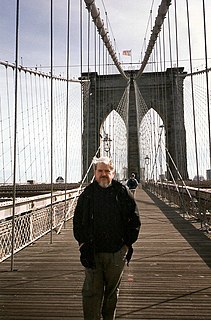A Quote by William Irwin Thompson
Hominid and human evolution took place over millions and not billions of years, but with the emergence of language there was a further acceleration of time and the rate of change.
Related Quotes
It's commonly assumed that the emergence of language was a key element of the great leap. We of course know very little about the sociopolitical conditions that existed at the time, but there's no scenario I can think of that suggests how a sudden change in these conditions could have led to the emergence of language.
We are here because over billions of years, countless variables fell into place, any of which could have taken another path. We are essentially a beautiful fluke, as are the millions of other species with which we share this planet. Our cells are composed of atoms and dust particles from distant galaxies, and from the billions of living organisms that inhabited this planet before us.
We might expect intelligent life and technological communities to have emerged in the universe billions of years ago. Given that human society is only a few thousand years old, and that human technological society is mere centuries old, the nature of a community with millions or even billions of years of technological and social progress cannot even be imagined. ... What would we make of a billion-year-old technological community?
We started off with physical evolution and got our form. Then we somehow developed language, which meant cultural evolution could race so we could change our behavior really quickly instead of over hundreds and hundreds of years. And then comes moral evolution, which means we're not frightfully far along with people. And maybe we end up with a spiritual evolution, which is this connectedness with the rest of the life forms on the planet.
The fact that all our ape cousins - chimpanzees, gorillas and orangutans - can acquire signs - is powerful evidence that our hominid ancestors' first language was gestural and that the vocal version of language was a relatively recent development. My own guess is that vocal language began emerging about 200,000 years ago.
I don't know if most people have truly taken on board what this says about our place in the natural world. It doesn't mean that humans are dominating the Earth, ruling over all of nature. In fact, it is a reminder that we are only a tiny part of nature, at the mercy of a system whose operations predate us by billions of years, and will continue billions of years after we're gone.







































